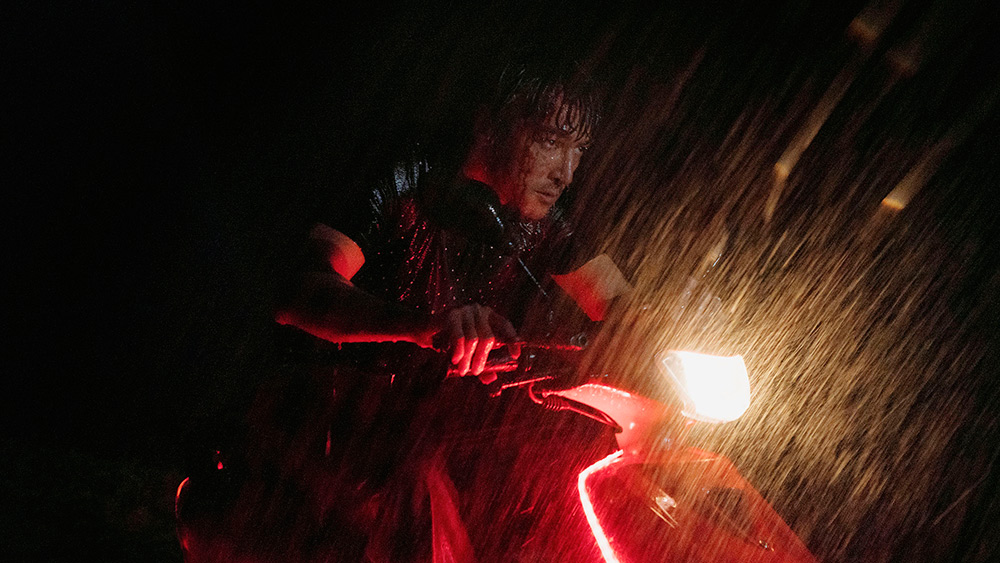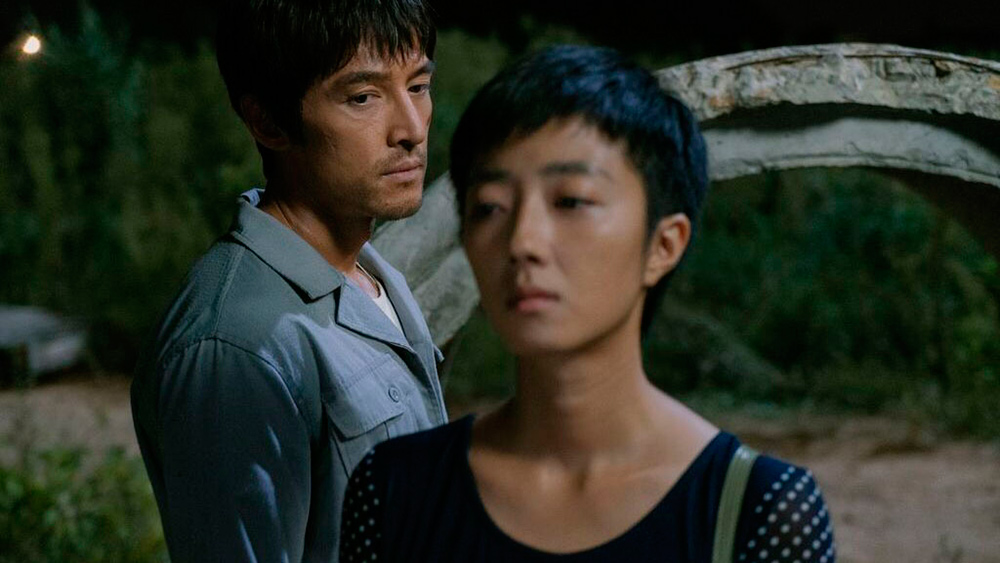
刁亦男执导的《南方车站的聚会》通过强烈的视觉冲击和独特的气质,将黑色电影代入了雨水漫天的街道和中国“二线城市”的面貌。
影片以繁荣的湖北省会武汉及周边地区为背景(由于新冠肺炎疫情爆发,目前湖北全省尚处在隔离状态),讲述了中国超大型城市以外的社会现实。2014年,刁亦男凭借《白日焰火》获得了当年的柏林电影节最佳影片。
在这部新作中,小混混周泽农(胡歌饰)因为被卷入摩托车盗窃团伙争夺地盘的械斗,无意中杀死了一名警察,不得不走上逃亡之路。在逃避警察和更为残忍的黑社会势力途中,他邂逅了一名性工作者刘爱爱(桂纶镁饰),而后者也有着神秘的动机。两人共同设计了一个繁复的计划,即使在重案组刘队长(廖凡饰)与警方的全方位围追堵截之下,周泽农仍然可以悄悄获得举报自己的那笔赏金。故事生猛而复杂,每个场景都环环相扣,例如警方突袭一座建筑的情节;霓虹灯照亮的小路上上演的摩托车追逐戏;夜间广场舞背景下一双运动鞋闪闪发光,直到变得血迹斑斑……这一切都将观众带入了高度紧张的超现实氛围中。
《南方车站的聚会》去年在中国上映后大受欢迎,并先后进入各大国际电影节展映环节。而在去年秋天举办的纽约国际电影节上,刁亦男在翻译的陪同下接受了《财富》杂志的专访。《南方车站的聚会》现已在纽约电影论坛上映,预计将于3月份陆续登陆全美院线,并将在此后不久上线视频点播影院。
为简明起见,以下访谈经过编辑。
《南方车站的聚会》参加了各大国际电影节,您发现美国观众和欧洲观众对这部中国电影的反应有什么不同?
纽约的观众和戛纳的观众很不一样。在戛纳电影节上,人们会很严肃地看待各种问题,比如怎样提出批评、怎样看待叙事和结构。而在纽约,人们通常更加放松。他们都是影迷,他们热爱电影,会沉浸其中,然后积极地做出回应。我数了一下,纽约观众在观影过程中放声大笑的次数大约有15次。有两到三个镜头,他们可能被露骨的画面吓到了。还有两到三个场景,观众明显被影片氛围和故事情节吸引住了。

我最初的想法是:“怎么才能用纯粹的电影语言,通过画面和台词来捕捉角色和故事的内涵?”我想使用更多的动作镜头,而不是对白和语言,因为我认为人类——特别是这些人物——是他们每个行为的总和。我想生动地捕捉这些行为,从而捕捉到这些人物所代表的品质。这样我就能展露出他们的幽默和人性。
从叙事的角度来说,我特别希望偏离传统的好莱坞结构。这种结构往往非常精致,但它的框架也是线性的。导演要确保观众“看懂了”,要让他们在第一时间毫无障碍地解码电影。为了捕捉当代感,我需要把它分解、打破叙事结构,为观众制造障碍和挑战。我要迫使他们参与解读,解码他们所看到的画面,而不是被动地接受教条的灌输和宣讲……我想制造挑战,这样观众才会被迫参与进来。
黑色电影往往会通过黑帮、警察、蛇蝎美女等人物形象来探索这些原型。您在重塑这个电影子类的时候,是怎样敲定主角类型的?
本片的主题可以归结到周泽农这个人物身上,他和所有人一样,也希望预见自己的死亡。他想到了死,想到自己会怎样死去。于是他想知道:“怎么才能完全按照我的计划去死呢?”这就创造一种美感,他(注定的)死亡成了展现他逃离过去的生活、逃离前妻和家人的一种方式。接着因为一场偶然的冲突和警察的被杀,引发了后来的一系列事件。他发现他可以设计或安排自己的死亡,或许他能让自己得到救赎,让生命变得更有意义。
影片中的这场交战很有意思,周泽农一方面要躲避警察,一方面也在努力逃避心中的内疚感和责任感。《南方车站的聚会》有时非常抽象,似乎更容易在感情上产生强烈的冲击,而不是坚持直白的叙述。在叙事过程中,您是怎样运用美学符号来表达自己的意图的?
我希望重点表现人物的行为和动作,因为正是这些行动体现了他们的内心情感和心理状态。比方看日本的歌舞伎表演,你会发现叙事或情节并不重要。故事情节大家都非常熟悉,但当我们一遍又一遍观看表演时,我们看的是台上男女演员的肢体语言,不论是语音语调还是移动手指和身体的方式,我们看的是他们怎样用非常抽象的语言来讲述整个故事。这是最纯粹的表达和抽象形式,可以在某种意义上展露一个人的内在灵魂。与其说这部电影想要表达叙事意义,不如说它更注重动作和行为。

《南方车站聚会》中有许多镜头展现了被雨水冲刷的街道和黑暗的小巷。这部电影在武汉拍摄,它属于黑色片,同时也重构了这种城市空间。能谈谈您是怎么创作影片布景的吗?
这种理想的抽象形式和氛围,从另一方面来说也与选择的空间密切相关。通过认真思考城市规划的问题,你会对都市社会有一个认识。你会对当代城市生活产生近乎乌托邦式的印象。但是在它背后,或者说在这个乌托邦的边缘,你也能看到许多异托邦的空间和环境。当你通过高速公路从郊区进入开发区和公园,看到城市里的酒吧和高档酒店,这种现象在当代中国社会非常普遍。这些空间可能会显得非常神秘,它也是许多争议所在:它介于法律的灰色地带,是非对错并不是泾渭分明的。我在这部电影中创造的氛围和人物,与这些灰色异托邦里的人有一样的想法,他们也希望通过自己的行为和姿态来实现自我。(财富中文网)
译者:智竑
刁亦男执导的《南方车站的聚会》通过强烈的视觉冲击和独特的气质,将黑色电影代入了雨水漫天的街道和中国“二线城市”的面貌。
影片以繁荣的湖北省会武汉及周边地区为背景(由于新冠肺炎疫情爆发,目前湖北全省尚处在隔离状态),讲述了中国超大型城市以外的社会现实。2014年,刁亦男凭借《白日焰火》获得了当年的柏林电影节最佳影片。
在这部新作中,小混混周泽农(胡歌饰)因为被卷入摩托车盗窃团伙争夺地盘的械斗,无意中杀死了一名警察,不得不走上逃亡之路。在逃避警察和更为残忍的黑社会势力途中,他邂逅了一名性工作者刘爱爱(桂纶镁饰),而后者也有着神秘的动机。两人共同设计了一个繁复的计划,即使在重案组刘队长(廖凡饰)与警方的全方位围追堵截之下,周泽农仍然可以悄悄获得举报自己的那笔赏金。故事生猛而复杂,每个场景都环环相扣,例如警方突袭一座建筑的情节;霓虹灯照亮的小路上上演的摩托车追逐戏;夜间广场舞背景下一双运动鞋闪闪发光,直到变得血迹斑斑……这一切都将观众带入了高度紧张的超现实氛围中。
《南方车站的聚会》去年在中国上映后大受欢迎,并先后进入各大国际电影节展映环节。而在去年秋天举办的纽约国际电影节上,刁亦男在翻译的陪同下接受了《财富》杂志的专访。《南方车站的聚会》现已在纽约电影论坛上映,预计将于3月份陆续登陆全美院线,并将在此后不久上线视频点播影院。
为简明起见,以下访谈经过编辑。
《南方车站的聚会》参加了各大国际电影节,您发现美国观众和欧洲观众对这部中国电影的反应有什么不同?
纽约的观众和戛纳的观众很不一样。在戛纳电影节上,人们会很严肃地看待各种问题,比如怎样提出批评、怎样看待叙事和结构。而在纽约,人们通常更加放松。他们都是影迷,他们热爱电影,会沉浸其中,然后积极地做出回应。我数了一下,纽约观众在观影过程中放声大笑的次数大约有15次。有两到三个镜头,他们可能被露骨的画面吓到了。还有两到三个场景,观众明显被影片氛围和故事情节吸引住了。
我最初的想法是:“怎么才能用纯粹的电影语言,通过画面和台词来捕捉角色和故事的内涵?”我想使用更多的动作镜头,而不是对白和语言,因为我认为人类——特别是这些人物——是他们每个行为的总和。我想生动地捕捉这些行为,从而捕捉到这些人物所代表的品质。这样我就能展露出他们的幽默和人性。
从叙事的角度来说,我特别希望偏离传统的好莱坞结构。这种结构往往非常精致,但它的框架也是线性的。导演要确保观众“看懂了”,要让他们在第一时间毫无障碍地解码电影。为了捕捉当代感,我需要把它分解、打破叙事结构,为观众制造障碍和挑战。我要迫使他们参与解读,解码他们所看到的画面,而不是被动地接受教条的灌输和宣讲……我想制造挑战,这样观众才会被迫参与进来。
黑色电影往往会通过黑帮、警察、蛇蝎美女等人物形象来探索这些原型。您在重塑这个电影子类的时候,是怎样敲定主角类型的?
本片的主题可以归结到周泽农这个人物身上,他和所有人一样,也希望预见自己的死亡。他想到了死,想到自己会怎样死去。于是他想知道:“怎么才能完全按照我的计划去死呢?”这就创造一种美感,他(注定的)死亡成了展现他逃离过去的生活、逃离前妻和家人的一种方式。接着因为一场偶然的冲突和警察的被杀,引发了后来的一系列事件。他发现他可以设计或安排自己的死亡,或许他能让自己得到救赎,让生命变得更有意义。
影片中的这场交战很有意思,周泽农一方面要躲避警察,一方面也在努力逃避心中的内疚感和责任感。《南方车站的聚会》有时非常抽象,似乎更容易在感情上产生强烈的冲击,而不是坚持直白的叙述。在叙事过程中,您是怎样运用美学符号来表达自己的意图的?
我希望重点表现人物的行为和动作,因为正是这些行动体现了他们的内心情感和心理状态。比方看日本的歌舞伎表演,你会发现叙事或情节并不重要。故事情节大家都非常熟悉,但当我们一遍又一遍观看表演时,我们看的是台上男女演员的肢体语言,不论是语音语调还是移动手指和身体的方式,我们看的是他们怎样用非常抽象的语言来讲述整个故事。这是最纯粹的表达和抽象形式,可以在某种意义上展露一个人的内在灵魂。与其说这部电影想要表达叙事意义,不如说它更注重动作和行为。
《南方车站聚会》中有许多镜头展现了被雨水冲刷的街道和黑暗的小巷。这部电影在武汉拍摄,它属于黑色片,同时也重构了这种城市空间。能谈谈您是怎么创作影片布景的吗?
这种理想的抽象形式和氛围,从另一方面来说也与选择的空间密切相关。通过认真思考城市规划的问题,你会对都市社会有一个认识。你会对当代城市生活产生近乎乌托邦式的印象。但是在它背后,或者说在这个乌托邦的边缘,你也能看到许多异托邦的空间和环境。当你通过高速公路从郊区进入开发区和公园,看到城市里的酒吧和高档酒店,这种现象在当代中国社会非常普遍。这些空间可能会显得非常神秘,它也是许多争议所在:它介于法律的灰色地带,是非对错并不是泾渭分明的。我在这部电影中创造的氛围和人物,与这些灰色异托邦里的人有一样的想法,他们也希望通过自己的行为和姿态来实现自我。(财富中文网)
译者:智竑
Visually breathtaking and staged with singularly arresting style, Diao Yinan's The Wild Goose Lake relocates film noir within the rain-slicked streets and hardscrabble realities of China's "second-tier" cities.
Set in and around Wuhan, the capital of the country's bustling Hubei province (currently quarantined amid the coronavirus outbreak), the film focuses on the corruption and inequity of life just beyond China's towering megacities. Diao, best known for directing 2014's Black Coal, Thin Ice (which won its year's Berlinale), is marvelously skilled at telling distinctly Chinese stories—of economic poverty and quiet lawlessness, heavy-handed police and amoral civilians just scraping by—in the language of noir.
His latest follows a small-time gangster, Zhou Zenong (Hu Ge), who's forced into hiding after inadvertently killing a police officer in the process of navigating a turf war between rival gangs of motorcycle thieves. Struggling to fend off both law enforcement and a more ruthless array of mobsters out for blood, he eventually intersects with Liu Aiai (Gwei Lun-mei), a sex worker with mysterious motivations of her own. Together, they hatch a convoluted scheme through which he can discreetly collect the bounty on his own head, even as enemies led by police captain Liu (Liao Fan) close in from every direction. It's a vibrant, labyrinthine story in which every perfectly composed sequence—police storming a complex with brutal intent, a nocturnal motorcycle chase down neon-lit backroads, a public dance in which light-up sneakers gleam through the night until they're flecked with blood—draws the audience deeper into its surreal, heightened atmosphere.
A massive hit upon its release in China, The Wild Goose Lake made its way along the international festival circuit this past year—including a stop at the New York Film Festival last fall, where Diao and a translator sat for an interview with Fortune. Currently screening at New York's Film Forum, The Wild Goose Lake is rolling out in U.S. theaters across March and will hit VOD shortly thereafter.
The following conversation has been edited and condensed for clarity.
In bringing The Wild Goose Lake along the festival circuit, what differences have you observed between American and European audiences in terms of their reactions to this Chinese noir?
The New York audience is very different from the Cannes audience. At Cannes, they tend to take it all very seriously in terms of how to offer critiques, how to see the problems of the narrative and structure. In New York, they tend to be more relaxed. They're cinephiles, and they love films. They immerse themselves into them and react in a lively manner. I've tallied, and there are maybe 15 moments in the movie where the New York audience laughs out loud, two or three where people are really shocked and taken aback by the graphic details of the imagery, and two or three instances where they're visibly engrossed by not only the mood but the plotlines in the story.
To me, the original idea was, "How can I capture characters and story using pure filmmaking languages, in terms of imagery and vocabulary?" I wanted to resort to actions moreso than dialogue and words, because I do think we as human beings—and especially these characters—are the sum of our actions. I wanted to capture those actions in a vivid way and in doing so capture the quality of what these characters embody. From there, I could tease out their humor and humanity.
Narratively, I really wanted to stray from conventional Hollywood structures, which tend to be very polished and also linear in terms of framework. They want to make sure the audience "gets it," immediately, without any difficulty in decoding the film. In order to capture a contemporary feel [to the noir genre,] I needed to fragment it, to fracture the narrative structure in a way that I was creating certain barriers, hurdles, and challenges for audiences. I force them to be part of that process of interpreting, decoding what they're looking at, rather than just passively looking at this dogma being preached onto the audience... I wanted to create challenges so the audience will be forced to participate.
Film noir tends to explore these archetypes in terms of character—the gangster, the cop, the femme fatale. How did you select the kind of lead character you wanted to have a role in your reinvention of the subgenre?
The themes of this particular film can be boiled down to the character of Zhou Zenong and how he, just like everyone else, wishes to foresee his own death. He thinks about death, how he's going to die. In this case, he questions, "How am I going to die in a way I have full control of?" This creates some sense of aesthetic, his [inevitable] dying becoming a way to show how he'd been escaping from his previous life, his ex-wife, his family, and then—because of this chance encounter and also the killing of the cop—this chain of events that's initiated. He realizes that he can design or plan his death in a way that might somehow redeem him and give meaning to his life.
It's fascinating how that battle plays out in the film, as Zenong runs from the cops but also struggles to escape his own senses of guilt and responsibility. The Wild Goose Lake becomes beautifully abstract in places, seeming more to wash over you than it does to adhere to a straightforward narrative. How did you craft aesthetics that would match and mirror your intentions as a storyteller?
We wanted to narrow in on the actions and gestures of the characters, because I believe those actions really embody what's going on within them emotionally and psychologically. If you look at the Kabuki theatre in Japan, it's not so much about the narrative or plot lines. We know those stories well, by heart, but when we see those shows again and again, it's to see how each actor and actress onstage uses their body to tell the story in such an abstract way, whether it's the pitch of their voice or the way they move their fingers and their bodies. It's the purest form of expression and abstraction, to somehow tease out what's going on in one's inner soul. This film is not so much about narrative meanings and much more about actions and movements.
The Wild Goose Lake, within Wuhan, reimagines that space as so belonging to the noir subgenre, with all its rain-slicked streets and dark alleyways. Can you tell me about crafting that setting?
The other aspect of this ideal abstraction, the atmosphere, is very much about the space that has been selected. In this formal way of thinking about city planning, you have an ideal of what an urban society means. There's this almost utopia image of what it means to live in urban contemporary cities. Beneath that, or on the peripheral areas of this utopia space, you also have these dystopian spaces or locations. That's very prevalent in contemporary Chinese society, when you're somewhere around these suburban areas, entering development zones and parks by the highways, bars and sleazy hotels in suburban towns. Those are spaces that can become very mysterious, and they're also the space and location of much controversy—the gray area between what's legal and illegal, what's right and wrong. The atmosphere and characters I wanted to create in this particular film share this idea of what people do in these gray, dystopian areas, how they actualize themselves through the actions and gestures they make.






